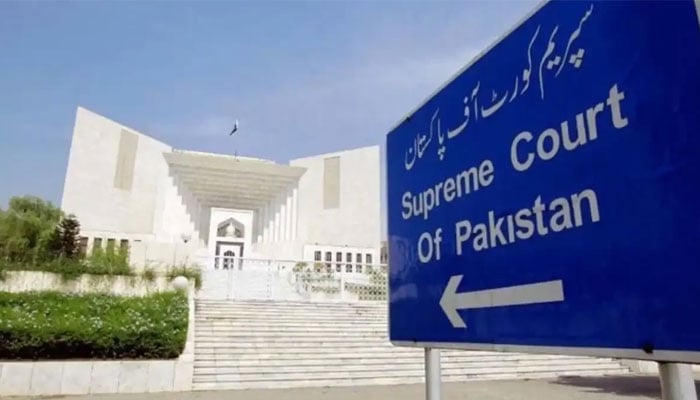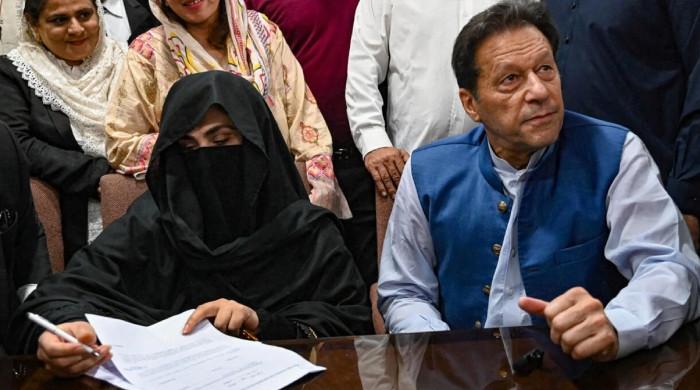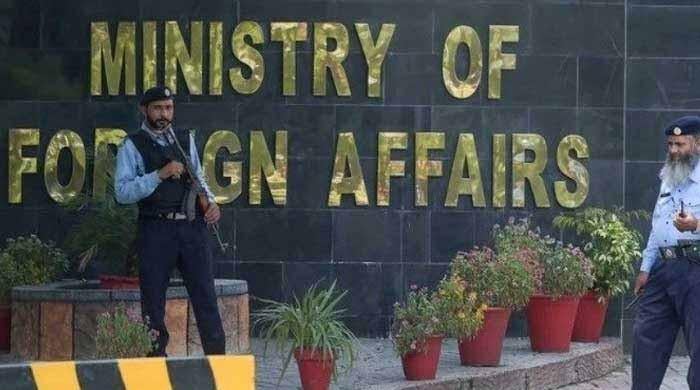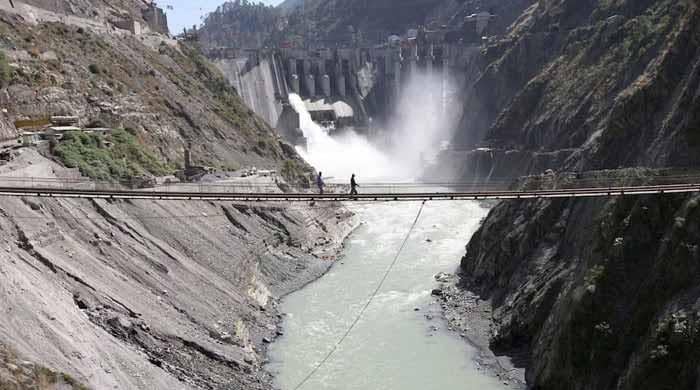Lawyers weigh in on SC verdict in NAB amendments case
SC accepts intra-court appeals against Sept 15 majority judgement in NAB amendments case
September 06, 2024

In a landmark decision on Friday, the Supreme Court accepted the intra-court appeals filed by the federal and provincial governments against the September 15, 2023 majority judgement in the National Accountability Bureau (NAB) amendments case.
A larger bench, headed by Chief Justice of Pakistan (CJP) Qazi Faiz Isa, ruled unanimously against the ex-CJP Umar Ata Bandial-led bench's verdict striking down the amendments to the National Accountability Ordinance (NAO).
The five-member bench reserved the verdict on June 6 on multiple appeals against the apex court's September 15 verdict which was announced by Bandial.
'Strange' decision
Reacting to the SC verdict, Barrister Asad Rahim Khan said: "Yet another strange and barely reasoned decision by this chief justice. That NAB had become an instrument of coercion and required reforming was plain for all to see.
"But the PDM regime's solution — to gut the entire organisation via a set of person-specific amendments — was laughably illegal: a small segment of the political class getting rid of cases against itself.
Barrister Khan said that the "act of desperation has now been legalised by the court" on the basis that the public’s fundamental rights haven’t been affected.
"This is Nero playing the lyre: by the same metric, the Supreme Court should have decided to the contrary when it came to the National Reconciliation Ordinance — another exercise in which undemocratic forces had to launder politicians for cobbling together a government.
"These are bad decisions making for bad jurisprudence — the kind bereft of law, precedent, or serving the public interest," he added.
Judgement doesn't concern itself with amendments
Lawyer Salaar Khan said much of the discourse around the NAB amendments has been "partisan and disconnected" from the true role and effect of accountability laws in our political history.
"There is, in fact, a strong case to be made that many of the amendments made to these laws were steps in the right direction. Today's verdict restores those amendments.
"However, to be clear, the Supreme Court's judgement doesn’t concern itself with the substance of the amendments. Rather it simply finds, on appeal, that the previous decision failed to meet the proper threshold for declaring a law enacted by Parliament to be unlawful," he said.
The lawyer emphasised that more particularly, it holds that no clear violation of the Constitution was identified. "In doing so, it stays true to the proper role of a court, as it reviews the constitutionality of laws passed by Parliament."
Judgement viewed amendments from moral lens
Barrister Rida Hosain said that the dissent by Justice Syed Mansoor Ali Shah in the original case — now the majority view in appeal — is the correct one.
"The original judgement viewed the NAB amendments from a moral lens, rather than a legal lens," she said, adding that in any case, "the central point in the original judgement was that by increasing the threshold value of offences to be investigated and tried by NAB, 'parliament has absolved' holders of public office for their actions. The perception was that politicians would go scot-free".
"It is wrong to say that the NAB amendments immunise elected holders of public office from accountability. The amendments raise the threshold value of offences to be investigated and tried by the accountability watchdog," said Barrister Hosain.
She further said the point remains that elected holders of public office are still triable under other laws of the land i.e., Prevention of Corruption Act 1947 and the Pakistan Penal Code 1860 for corruption and corrupt practices.
"This is a change of forum."
"The fundamental problem in Pakistan is that quests for 'accountability' have been and continue to be linked to political engineering. The absence of laws is not the problem," she added.
Decision passed 'more on constitutionality of judgement'
Barrister Ahmad Pansota said he believes the decision has been passed more on the constitutionality of the judgement which was passed by then-CJP Bandial.
"Judgement by Bandial Justice Bandial was right and since it was passed on Article 1843, and very clearly anti-graft laws and anti-corruption laws were a matter of public importance and there was a violation of fundamental right when the matter relates to embezzlement of money for public exchequer."
He said he believes the amendments were "kind of okay" which was struck down by that judgement and amended partly.
"But this judgement relies more on the constitutionality of that and that’s one way of looking at it. The existing chief justice has a very strict view about the power of the Parliament to legislate on a subject which nobody denies but that legislation — if done with the intent to benefit the Parliamentary class itself — has to be looked through a judicial view or prism," said Barrister Pansota.
"I think from that point-of-view, I don't agree with the ratio of this judgement. However, it’s a judgement and we are supposed to follow that. But my fair comment would be that this judgement should have been more detailed and, the way it touches upon the constitutionality of the previous judgement, it does not explain how that qualifies."
Judgement to have 'long lasting effect'
Advocate Supreme Court Hafiz Ehsaan Ahmad Khokhar stated that the current ruling and the legislative competency of the Parliament is significant since it is ratified by all five members unanimously and overturns the previous and now on the benefits or application of these amendments would be extended from January 1985 to onwards.
He said that while deciding the present appeals filed under section 5 of the Practice and Procedure Act 2013, the SC bench not only accepted the appeals of federal government and private persons by upholding the legislative competency of the Parliament but also gave very important constitutional observation that though the petitioner had challenged the NAB amendments, therefore, it had to be established that the two pre-requisites of Article 184(3) of the Constitution by him but he "failed to do so".
"The present judgement would have a long lasting effect on the legislative competency of the Parliament, Supreme Court jurisdiction under Article 184(3) of the Constitution, locus standi of the petitioner and the future accountability process in Pakistan but simultaneously there is a dire need for a transparent, robust, neutral and credible accountability system through proper and meaningful legislation to be introduced immediately which has credible set-up by having best practices around the world and modern techniques," added Advocate Khokhar.
'Good one'
Speaking to Geo.tv, lawyer Reza Ali described the apex court decision as “a good one,” saying it laid bare the previous judgment and “attacked it for its lack of reasoning”.
“I think the ultimate judgment is that parliament is supreme, it needs to be respected and unless any legislation that comes in is actually contrary to the Constitution, which is not demonstrated here. There was no merit in the petition that the actual judgement should be set aside,” he added.
Verdict affirms authority of Parliament
Lawyer Sheikh Saqib Ahmed, speaking to Geo.tv said, quoted CJP Isa when he accepted the appeals in the NAB amendments case.
CJP Isa stated: "The impugned judgment did not test the Amendments on the touchstone of the Constitution; it instead proceeded to consider the Amendments by applying their lordships' own criteria and yardstick, which, with respect, was not permissible in terms of the Constitution."
Ahmed, however, said that "if we are trying to comprehend any order or judgment based upon the Constitution, we must bear in mind that while interpreting or adjudicating these matters, a judge can (not explicitly) interpret any article according to their own understanding, whims, or needs, and conclude in favor of either side".
"In the present matter, the entire case revolves around Article 184(3) of the Constitution, which confers original jurisdiction upon the apex court. This provision has two key independent components: first, the matter must involve a question of public importance; and second, it must relate to the enforcement of fundamental rights. Both the former and later benches interpreted Articles 9, 14, 23, and 25 of the Constitution differently; one adopting a broad interpretation, while the other approached the matter on more technical and seemingly rigid grounds," he explained.
The lawyer said that the SC, in its verdict, emphasised that no grounds had been presented to demonstrate how the amendments resulted in a violation of fundamental rights, such as the security of person, equality of citizens, inviolability of human dignity, or protection of property.
"Furthermore, the court highlighted that the petitioner, Imran Khan, did not approach the Court in bona-fide," he said.
Ahmed said the recent verdict reinforces the doctrine of separation of powers and affirms the authority of Parliament to enact or amend laws, provided such laws do not conflict with the Fundamental Rights enshrined in the Constitution.
"By upholding the principle of Constitutional Supremacy, the Court acknowledges that all organs of the state, including the Parliament and Judiciary, derive their existence and authority from the Constitution. In my humble view, this decision establishes a significant precedent.
"However, it remains to be seen whether the Judiciary will adhere to this stance in the future, particularly the principle that the Judiciary cannot re-write the Constitution, as emphasised in the judgment," said Ahmed, adding that "merely because this Court considers that it could have drafted or formulated a law better than Parliament does not empower it to strike down or disregard legislation."









